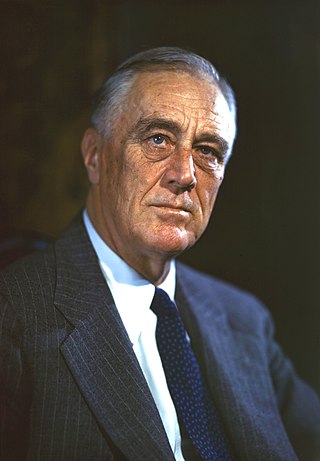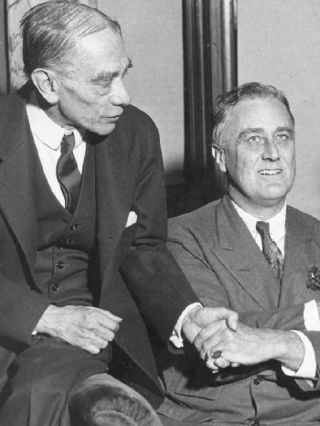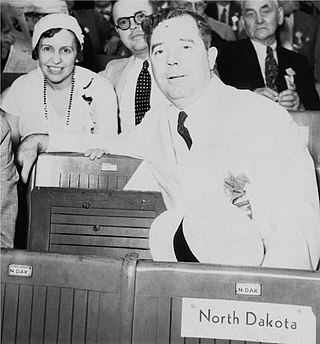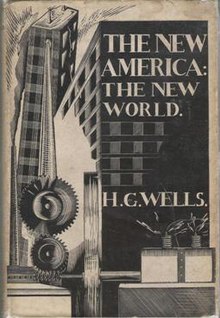
Franklin Delano Roosevelt, commonly known by his initials FDR, was an American politician and statesman who served as the 32nd president of the United States from 1933 until his death in 1945. He was a member of the Democratic Party and is the only U.S. president to have served more than two terms in office. During his third and fourth terms he was preoccupied with World War II.

The Four Freedoms were goals articulated by U.S. President Franklin D. Roosevelt on Monday, January 6, 1941. In an address known as the Four Freedoms speech, he proposed four fundamental freedoms that people "everywhere in the world" ought to enjoy:
- Freedom of speech
- Freedom of worship
- Freedom from want
- Freedom from fear

The 1936 United States presidential election was the 38th quadrennial presidential election, held on Tuesday, November 3, 1936. In the midst of the Great Depression, incumbent Democratic President Franklin D. Roosevelt defeated Republican Governor Alf Landon of Kansas. Roosevelt won the highest share of the popular vote (60.3%) and the electoral vote since the largely uncontested 1820 election. The sweeping victory consolidated the New Deal Coalition in control of the Fifth Party System.

The 1944 United States presidential election was the 40th quadrennial presidential election. It was held on Tuesday, November 7, 1944. The election took place during World War II, which ended the following year. Incumbent Democratic President Franklin D. Roosevelt defeated Republican Thomas E. Dewey to win an unprecedented fourth term. It was also the fifth presidential election in which both major party candidates were registered in the same home state; the others have been in 1860, 1904, 1920, 1940, and 2016.
The Neutrality Acts were a series of acts passed by the US Congress in 1935, 1936, 1937, and 1939 in response to the growing threats and wars that led to World War II. They were spurred by the growth in isolationism and non-interventionism in the US following the US joining World War I, and they sought to ensure that the US would not become entangled again in foreign conflicts.

Henry Agard Wallace was an American politician, journalist, farmer, and businessman who served as the 33rd vice president of the United States, from 1941 to 1945, under President Franklin D. Roosevelt. He served as the 11th U.S. secretary of agriculture and the 10th U.S. secretary of commerce. He was the nominee of the new Progressive Party in the 1948 presidential election.

Huey Pierce Long Jr., nicknamed "The Kingfish", was an American politician who served as the 40th governor of Louisiana from 1928 to 1932 and as a United States senator from 1932 until his assassination in 1935. He was a left-wing populist member of the Democratic Party and rose to national prominence during the Great Depression for his vocal criticism of President Franklin D. Roosevelt and his New Deal, which Long deemed insufficiently radical. As the political leader of Louisiana, he commanded wide networks of supporters and often took forceful action. A controversial figure, Long is celebrated as a populist champion of the poor or, conversely, denounced as a fascistic demagogue.

Share Our Wealth was a movement that began in February 1934, during the Great Depression, by Huey Long, a governor and later United States Senator from Louisiana. Long first proposed the plan in a national radio address, which is now referred to as the "Share Our Wealth Speech". To stimulate the economy, the Share Our Wealth program called for massive federal spending, a wealth tax, and wealth redistribution. These proposals drew wide support, with millions joining local Share Our Wealth clubs. Roosevelt adopted many of these proposals in the Second New Deal.
Alan Brinkley was an American political historian who taught for over 20 years at Columbia University. He was the Allan Nevins Professor of History until his death. From 2003 to 2009, he was University Provost.

Rexford Guy Tugwell was an American economist who became part of Franklin D. Roosevelt's first "Brain Trust", a group of Columbia University academics who helped develop policy recommendations leading up to Roosevelt's New Deal. Tugwell served in FDR's administration until he was forced out in 1936. He was a specialist on planning and believed the government should have large-scale plans to move the economy out of the Great Depression because private businesses were too frozen in place to do the job. He helped design the New Deal farm program and the Resettlement Administration that moved subsistence farmers into small rented farms under close supervision. His ideas on suburban planning resulted in the construction of Greenbelt, Maryland, with low-cost rents for relief families. He was denounced by conservatives for advocating state-directed economic planning to overcome the Great Depression.

The "Day of Infamy" speech, sometimes referred to as The Infamy speech, was a speech delivered by Franklin D. Roosevelt, the 32nd president of the United States, to a joint session of Congress on December 8, 1941. The previous day, the Empire of Japan attacked United States military bases at Pearl Harbor and the Philippines, and declared war on the United States and the British Empire. The speech is known for its famed first line, which opened with Roosevelt saying, "Yesterday, December 7, 1941—a date which will live in infamy..."
The Second New Deal is a term used by historians to characterize the second stage, 1935–36, of the New Deal programs of President Franklin D. Roosevelt. The most famous laws included the Emergency Relief Appropriation Act, the Banking Act, the Wagner National Labor Relations Act, the Public Utility Holding Companies Act, the Social Security Act, and the Wealth Tax Act.

Louis McHenry Howe was an American reporter for the New York Herald best known for acting as an early political advisor to President Franklin D. Roosevelt.
The Commonwealth Club Address was a speech made by New York Governor and Democratic presidential nominee Franklin Delano Roosevelt at the Commonwealth Club of California in San Francisco on his 1932 presidential campaign. Roosevelt said the era of growth and unrestricted entrepreneurship had ended, and the individualism must give way to collective action. He was not at all specific, but he hinted at liberal reforms of the sort that emerged in The First Hundred Days after his inauguration in March 1933. Scholars rate it among the 100 greatest speeches made by a President in the 20th century.

The first term of the presidency of Franklin D. Roosevelt began on March 4, 1933, when he was inaugurated as the 32nd president of the United States, and the second term of his presidency ended on January 20, 1941, with his inauguration to a third term. Roosevelt, the Democratic governor of the largest state, New York, took office after defeating incumbent President Herbert Hoover, his Republican opponent in the 1932 presidential election. Roosevelt led the implementation of the New Deal, a series of programs designed to provide relief, recovery, and reform to Americans and the American economy during the Great Depression. He also presided over a realignment that made his New Deal Coalition of labor unions, big city machines, white ethnics, African Americans, and rural white Southerners dominant in national politics until the 1960s and defined modern American liberalism.

The third presidential term of Franklin D. Roosevelt began on January 20, 1941, when he was once again inaugurated as the 32nd president of the United States, and the fourth term of his presidency ended with his death on April 12, 1945. Roosevelt won a third term by defeating Republican nominee Wendell Willkie in the 1940 United States presidential election. He remains the only president to serve for more than two terms. Unlike his first two terms, Roosevelt's third and fourth terms were dominated by foreign policy concerns, as the United States became involved in World War II in December 1941.

The 1940 United States presidential election in Louisiana took place on November 5, 1940, as part of the 1940 United States presidential election. State voters chose ten representatives, or electors, to the Electoral College, who voted for president and vice president.

The 1936 United States presidential election in North Dakota took place on November 3, 1936, as part of the 1936 United States presidential election. Voters chose four representatives, or electors to the Electoral College, who voted for president and vice president.

The 1936 United States presidential election in Louisiana took place on November 3, 1936, as part of the 1936 United States presidential election. Louisiana voters chose ten representatives, or electors, to the Electoral College, who voted for president and vice president.

Huey Long, the former governor of Louisiana, served in the United States Senate from 1932 until his assassination in 1935. A powerful figure, Long was integral in Franklin Roosevelt's 1932 Democratic Nomination and the election of the first woman, Hattie Caraway, to the US Senate. He was investigated for election discrepancies regarding the election of his friend John H. Overton, but no evidence of fraud was found. He proposed sweeping legislation, known as the Share Our Wealth plan, to end the Great Depression. Long often used filibusters to prevent or slow the passage of New Deal legislation.
















